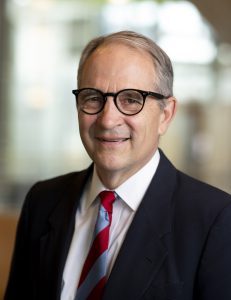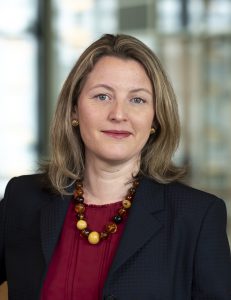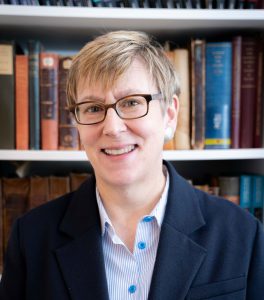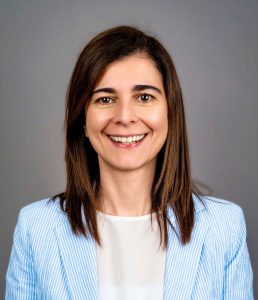By Adam Stone
When George Weber, J.D. ’13, was attending UBalt Law, the Arab Spring was in full swing. “I was taking classes in foreign relations law and international criminal law, so I was very interested in it,” he says.
Weber took his interest beyond the classroom, becoming a fellow with the Center for International and Comparative Law (CICL). There he helped organize symposia and dove deep into the complexities of the international legal landscape. “It was central to my UBalt experience,” says Weber, who is now an attorney-adviser at the Federal Communications Commission.
This year marks the 30th anniversary of CICL, a prestigious, nationally recognized center for international and comparative law scholarship. Founded in 1994 as the first research center in the law school, and one of the first research centers in the University of Baltimore, CICL leaders call this milestone a moment for celebration.
A global perspective

As it works to promote the study and practice of international law, CICL works directly with governments, non-governmental organizations and reform movements — “anyone who might have an interest in trying to advance international law,” says Prof. Mortimer “Tim” Sellers, director of the center.
Arguably, that could include almost everyone. As a legal system, “international law regulates the entire world,” Sellers says. It governs “how states interact with each other, with international institutions and even how states relate to their own citizens.”
That encompasses human rights, the conduct of war, trade and commerce. “All that has become more important as the world has gotten more integrated, as more and more things happen that cross international boundaries,” he says. Climate change is an obvious example: It’s a global phenomenon that demands a multi-national response.
In elevating the study of international law, CICL has helped other nations to thrive. The center’s direct work with the government of Brazil since the 1990s has strengthened democracy there, while in-person and institutional involvement in Ukraine — including participation at a major conference celebrating Lviv University’s special role in international law, and in reviving and working with the National University of Kiv Mohyla Academy — is assisting in its efforts to win global support amid the Russian invasion.
Closer to home, the center’s work has enriched the work of both faculty and students at UBalt Law.
Hand-on learning and engagement
As co-director of the Center, Prof. Nienke Grossman says CICL aims to creates opportunities for engagement with international law issues “both in theory and in practice.”

As a leading scholar working at the intersection of international law and women’s rights, she has involved students in hands-on projects. Last year, she and her students worked with the UN Special Rapporteur on the human rights situation in the Democratic People’s Republic of Korea, and she and a student traveled to the United Nations to support the Rapporteur’s work.
Her students also have engaged with the Free Yazidi Foundation, a non-governmental organization working on issues involving Yazidi women, who are part of an often-persecuted religious minority in the Middle East. “We had two students who interviewed members of the Yazidi community on the issue of forced child marriage in their communities, in both Iraq and Nebraska,” she says.
Grossman’s own credentials in international law run deep. For example, she was recently nominated by the United States and elected by member states of the Organization of American States to the Inter-American Juridical Committee, a body of 11 experts on public and private international law in the region. She is the first woman and Latina to serve on the Committee from the United States. Her scholarship on women and international law, feminist approaches, and international courts and tribunals is found in top international law journals and publications, and she is currently co-editing the Oxford Handbook on Women in International Law.
Sellers likewise is a highly lauded scholar in the field. He’s served as editor of a book series from the American Society of Comparative Law, and of the International Encyclopedia of Comparative Law.
Through the scholarly work of its leaders, CICL has impacted the efforts of UBalt Law faculty across a wide range of disciplines over the past 30 years, such as constitutional law, criminal law, and commercial transactions.

“Family law very often has an international or transnational component. There are a great number of people who have transnational marriages, or at least have a foot in one country or another besides the United States,” Sellers says. “It’s hard to imagine any aspect of law that doesn’t have an international component,” he says.
CICL’s executive director, Janet Lord, agrees. “Lawyers today ignore international law at their peril. Representation of a client in a family law matter may very well intersect with foreign and international law, due to property or custody elements.” And as Sellers emphasizes, trade obviously crosses national lines, as do criminal activities and the protection of the environment.
A new generation
Looking ahead, a rising generation of faculty are helping to ensure that CICL remains preeminent in the field.
“We recently hired Prof. Ioanna Tourkochoriti, a highly respected comparative law scholar and an expert on freedom of speech,” says Sellers. “Prof. Anne-Marie Carstens has joined our law faculty and is doing good work on cultural property. And Prof. Sonya Ziaja is an international environmental law scholar. Our future lies in these newer voices.”
Executive director Lord, who joined the Center in 2023, brings both a deep record of international legal practice and a track record of scholarly publications and recognition as a leading expert on international disability rights law.

“My focus at this juncture in my career is to help build the competence and confidence of our students in international law. Our proximity to the UN in New York, and to multiple institutions in Washington, D.C., helps make that possible,” she says. Lord looks forward to the coming academic year, when CICL fellows will produce legal analysis for the Organization for Security and Cooperation in Europe, support international criminal law advocacy at the UN, and work on collaborative research with our partner, the Harvard Law School Project on Disability.
Center leadership is proud of its accomplished past and ambitious future. “CICL has made substantial contributions to the law school, and it continues to do so, bringing renowned scholars and practitioners to campus and giving the community an opportunity to think beyond Baltimore, beyond Maryland, and even beyond the United States,” Grossman says.
Sellers describes the anniversary as a chance to reflect not just on the achievements of the center, but upon the vital role of international law as a discipline.
“In the absence of law, you have lives that are nasty, brutish, and short,” he says. International law, in particular, “gives us a way of coordinating our activities so that our lives are not a fountain of violence and corruption. It’s the line between barbarism and civilization.”
“What we’re doing at CICL is promoting civilization. If you want to have a peaceful and just world, the only way you can achieve it is through law.”
Adam Stone is a writer based in Annapolis.
